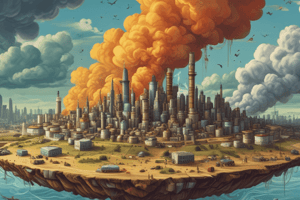Podcast
Questions and Answers
What is the estimated increase in the world's population from 2006 to 2050?
What is the estimated increase in the world's population from 2006 to 2050?
How long did it take for the human population to add the third 2 billion?
How long did it take for the human population to add the third 2 billion?
At what year did the population reach 7.1 billion?
At what year did the population reach 7.1 billion?
What is the estimated total human population when Homo sapiens evolved?
What is the estimated total human population when Homo sapiens evolved?
Signup and view all the answers
What is the impact of human population growth on natural capital?
What is the impact of human population growth on natural capital?
Signup and view all the answers
What event marked a significant shift in human population growth?
What event marked a significant shift in human population growth?
Signup and view all the answers
What is the cultural carrying capacity related to human population growth?
What is the cultural carrying capacity related to human population growth?
Signup and view all the answers
What factor affects human population size based on the given text?
What factor affects human population size based on the given text?
Signup and view all the answers
Where has most of the world's population growth occurred from 1950-2010?
Where has most of the world's population growth occurred from 1950-2010?
Signup and view all the answers
What are some impacts of human population growth according to the given text?
What are some impacts of human population growth according to the given text?
Signup and view all the answers
The human population growth has only increased in recent decades.
The human population growth has only increased in recent decades.
Signup and view all the answers
The cultural carrying capacity is the total number of people who could live indefinitely without decreasing the earth's ability to sustain future generations.
The cultural carrying capacity is the total number of people who could live indefinitely without decreasing the earth's ability to sustain future generations.
Signup and view all the answers
The fertility rate is the average number of children born to a woman during her lifetime.
The fertility rate is the average number of children born to a woman during her lifetime.
Signup and view all the answers
The replacement-level fertility rate is the number of children a couple must have to replace themselves.
The replacement-level fertility rate is the number of children a couple must have to replace themselves.
Signup and view all the answers
The natural capital degradation caused by human population growth includes reducing biodiversity and relying mostly on non-polluting and climate-changing fossil fuels.
The natural capital degradation caused by human population growth includes reducing biodiversity and relying mostly on non-polluting and climate-changing fossil fuels.
Signup and view all the answers
The human population has reached 7.1 billion in less than 50 years.
The human population has reached 7.1 billion in less than 50 years.
Signup and view all the answers
The world's population is projected to increase from 6.6 billion to 8.9 billion between 2006 and 2050.
The world's population is projected to increase from 6.6 billion to 8.9 billion between 2006 and 2050.
Signup and view all the answers
The total human population when Homo sapiens evolved was 2 billion.
The total human population when Homo sapiens evolved was 2 billion.
Signup and view all the answers
Industrial revolution resulted in the human population reaching 3 billion by the year 1960.
Industrial revolution resulted in the human population reaching 3 billion by the year 1960.
Signup and view all the answers
The continuing rapid growth of the human population raises questions about how long it can keep growing.
The continuing rapid growth of the human population raises questions about how long it can keep growing.
Signup and view all the answers




